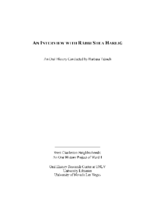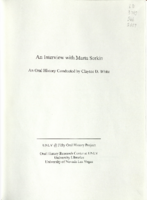Search the Special Collections and Archives Portal
Search Results

Transcript of interview with David Dahan by Barbara Tabach, May 26, 2016
Date
Archival Collection
Description
The fascinating life of David Dahan began in Casablanca, Morocco where he was born to Mathilde and Isaac Dahan in 1957. After a hasty departure in 1970 the family came to America and to Las Vegas. Isaac became an administrator for Yellow Cab and Mathilde was a server at the Stardust Hotel/Casino. David evokes a tale of growing up a teenager in a strange culture and then heading out on a solo adventure to learn about the world. By 1977, he fell in love and married an engaging Israeli nurse named Yaffa (1954-2007). Her legacy is the Yaffa Dahan Nursing Education Fund established to assist outstanding PhD nursing students in their dissertation research. Leadership and the energy to always say yes are among David?s many characteristics. He has served on numerous local boards, such as: Nevada Restaurant Association, North Vista Hospital, Touro University, Las Ventanas, Henderson Chamber of Commerce, and the Nevada Law Foundation. He has been the recipient of many awards and acknowledgments for his tireless efforts throughout Las Vegas. Among those is being named the 2005 Person of Influence by In Business Las Vegas. From 1997 ? 1999, he served as President of the Jewish Federation during which time he led a trip to Russia. He is past chair of AIPAC (American Israel Public Affairs) Committee. In 2007, David was honored as Mensch of the Year at Congregation Ner Tamid. In this interview he recalls his family?s escape from Morocco, learning to adjust to life in Las Vegas and his early jobs in the restaurant business. With his roots firmly planted in Las Vegas, David has built strong relationships within the Jewish and general Las Vegas communities. David is the Chief Executive Officer of Orgill/Singer Insurance. His life experiences have fueled passions for his faith, cooking, photography, poetry and his daughters, Shana and Michelle.
Text

Transcript of interview with Oscar Goodman by Claytee D. White November 10, 2014
Date
Archival Collection
Description
Oscar Baylin Goodman (1939- ) is the former mayor of the city of Las Vegas, Nevada, serving 12 years until 2011, when he swore in his wife of over 50 years, Carolyn Goodman. Oscar Goodman is the official ambassador of Las Vegas, and the chairman of the Las Vegas Convention and Visitors Authority (LVCVA) Host Committee. He is also known as one of the best criminal defense attorneys in the United States, and spent 35 years defending alleged Mob figures such as Meyer Lansky, Frank Rosenthal, and Anthony Spilotro. Goodman is the primary visionary and a member of the board of directors of The Mob Museum in downtown Las Vegas, which opened in 2012. Goodman was born June 26, 1939 in Philadelphia, Pennsylvania. He earned his undergraduate degree from Haverford College in 1961 and his law degree from the University of Pennsylvania Law School in 1964. That same year he moved to Las Vegas and in 1965 he was admitted to the Nevada State Bar. He served as Clark County?s chief deputy public defender from 1966 to 1967. Goodman was elected as mayor of Las Vegas for the first time in 1999. During his three terms (the legal limit), he contributed to the economic and cultural development of the downtown area by supporting projects such as the arts district and Union Park, a high-rise residential and business project he helped to secure 61 acres of land for. He helped to begin what he called the ?Manhattanization? of downtown, which included the construction of taller buildings for better use of the area?s prime real estate. In this interview, Goodman discusses the role of Judaism in his life, from childhood to adulthood to parenting his own four children. He touches on his involvement with Temple Beth Sholom, including serving as its president, as well as in local development projects like the Lou Ruvo Cleveland Clinic Brain Health Center, Smith Center for the Performing Arts, and Mob Museum. In addition, Goodman discusses the impact of Jewish residents on the city and its development, and mentions leaders in the gaming industry, legal profession and in politics.
Text

Transcript of interview with Doug Unger by Barbara Tabach, August 26, 2014
Date
Archival Collection
Description
Interview with Doug Unger by Barbara Tabach on August 26, 2014. In the interview, Unger discusses his schooling, his family's mattress business, and his endeavors in the company and the mattress industry in Las Vegas. Unger becomes involved in Holocaust education and the Sperling Kronberg Mack Holocaust Resource Center.
Doug Unger was born in Cleveland, Ohio, and grew up working summers in a mattress factory, a family business started by his maternal grandfather. After graduating from high school in Cleveland, Doug attended the University of Cincinnati until moving to Steamboat Springs, and enrolled in Denver University, though ended his college career one class away from graduation. Eventually, Unger moved back to Cleveland, then to Las Vegas. In 1976, Dough bought Supreme Mattress and moved to Las Vegas to build his new business. Outside his successful career, Doug was always an active member in the city's Jewish community. He joined Congregation Ner Tamid, where he was a trustee. He became involved with the Jewish Federation, serving as treasurer and later as president. When he moved to Reno, Doug joined Temples Sinai and Emanu-el, and also became heavily involved with Guide Dogs for the Blind Friends Committee, serving as its director for a period of time. He was also the co-chair of the Governor's Advisory Council on Education Related to the Holocaust (GAC). Doug was instrumental in establishing the Library for Holocaust Studies as a successful organization, independent of the Jewish Federation. The Library is now located in its own, donated space, run by trained staff, and receives $200,000 from the state biennially.
Text

Transcript of interview with Myra Berkovits by Barbara Tabach, August 21, 2014
Date
Archival Collection
Description
Interview with Myra Berkovits by Barbara Tabach on August 21, 2014. In this interview, Berkovits talks about growing up and starting her teaching career in Chicago. When she moves to Las Vegas, Berkovits eventually purchases a dining concierge business, but returned to teaching, and is now involved with the Sperling Kronberg Mack Holocaust Resource Center.
Myra Berkovits was born Myra Mosse in 1944 in Chicago, Illinois. She became an elementary school teacher in Chicago before moving to Las Vegas in 1980. Myra has made contributions to Las Vegas in the public and private sectors. She owned several businesses then returned to teaching, heading to the University of Nevada, Las Vegas (UNLV) to renew her teaching license and later received her master's degree. After a year of teaching in multicultural education, Myra was then in charge of the school district's homeless program, seeing its growth from serving 1,200 to 6,000 students. Myra's other passion was for Holocaust education and she became one of six interviewers in the city for the Shoah Foundation, documenting survivors' stories. One interviewee, David Berkovits, would later become her husband of fifteen years. Myra's own Holocaust education was aided by powerful trips to Israel and Poland. She used these experiences to develop and lead student-teacher conferences and classroom curriculum for the whole state. Myra still serves at the Education Specialist at the Holocaust Resource Center.
Text

Transcript of interview with Dorothy Eisenberg by Barbara Tabach, October 23, 2014
Date
Archival Collection
Description
Interview with Dorothy Eisenberg by Barbara Tabach on October 23, 2014. In this interview, Eisenberg discusses her upbringing on the east coast and becoming a widow with four children. She met her second husband at a synagogue, and they moved to Las Vegas for a fresh start. Eisenberg became involved with Temple Beth Sholom, and the Las Vegas League of Women Voters. She has a school named after her in the Clark County School District.
Dorothy Eisenberg is a first generation American, with roots in Ukraine and Central Europe, and grew up in Philadelphia. Judaism was a significant part of Dorothy's life from the beginning, and both her and her brother spent many of their afternoons at Hebrew school and most weekends at Shabbat services as adolescents. Eisenberg moved to Las Vegas with her children and second husband in 1964. She became an influential member of the community and served as the Jewish Federation of Las Vegas's first female president. She was also actively involved in the League of Women Voters of Las Vegas Valley, including leading the organization's advocacy for school desegregation and serving as its president for two years.
Text

Transcript of interview with Rabbi Shea Harlig by Barbara Tabach, March 5, 2014
Date
Archival Collection
Description
Interview with Rabbi Shea Harlig by Barbara Tabach on March 5, 2014. In this interview, Rabbi Harlig discusses the Chabad movement of Orthodox Judaism and establishment of Chabad centers in Las Vegas and Southern Nevada. Rabbi Harlig talks about the property he has acquired for Chabad, and its outreach programs, including supervision of kosher kitchens in hotels. This interview was conducted for the Ward 1: West Charleston Neighborhoods oral history project, and therefore includes zoning and neighborhood discrimination issues, and a tour of the property.
Rabbi Shea Harlig arrived in Las Vegas in 1990 and settled in the Artesian Heights neighborhood of Las Vegas. As Director of Chabad of Southern Nevada, Rabbi Harlig focuses on religious outreach, education and social services, and has helped establish seven Chabad locations throughout the community and also built a school and educational program of the highest standards.
Text

Transcript of interview with Jean Tobman, Marilyn Moran and Janie Moore by Claytee D. White, November 5, 2013
Date
Archival Collection
Description
Interview with Jean Tobman and two of her daughters, Marilyn (Tobman) Moran and Janie (Tobman) Moore by Claytee White, November 5, 2013. In this interview, Jean Tobman recalls coming to Las Vegas with her husband and two young children in the 1950s, and the life they established in the Pinto area of the Westside. Her husband, Herb, owned City Furniture and a cab company near downtown. Marilyn and Janie discuss their youth and the enjoyable time they had growing up in Las Vegas. Marilyn talks about how the city has grown and her time on the planning commission. Janie also discusses the growth of Las Vegas and her nostalgia for old Las Vegas.
In 1953, Jean and Herb Tobman moved from New Jersey to Las Vegas. The Tombans settled in the Pinto Palamino. Upon moving, Jean initially assisted her mother at her rooming house, and Herb worked with Jean's father at City Furniture. Herb bought his first cab soon thereafter, and grew one vehicle into Western Cab Company, which is still family-run. After a large fire closed City Furniture, Herb worked as the general manager at Moulin Rouge, jumpstarting his career in the gaming industry. Marilyn, Janie and Helen are the children of Jean and Herb and all still live in Las Vegas. The girls grew up keeping horses, as did many other neighbors in the Pinto area. Marilyn married John Moran, the sheriff's son, who served as a police officer himself. She sat on the planning commission for a decade, during the city's growth spurt. Janie spent a semester at Arizona State University before returning to Las Vegas to work at Stardust Hotel, a property co-owned by her father, who also served as the its president.
Text

Transcript of interview with Irwin Molasky by David G. Schwartz, April 23, 2014
Date
Archival Collection
Description
Interview with Irwin Molasky by David G. Schwartz, April 23, 2014. In this interview, Irwin Molasky discusses arriving in Las Vegas in the 1950s, and building the Pyramids motel on the Strip. He talks about the entertainers in various hotels on the Strip, the concept of the "star policy," and bringing Parisian shows to Las Vegas. He goes on to discuss his real estate developments, including Paradise Palms, Boulevard Mall, and Sunrise Hospital, and donating the land for the development of UNLV.
Irwin Molasky came to Las Vegas in 1951, during a time when "everyone knew everyone else," and there was a small, but strong Jewish community. An Army veteran, Irwin and his wife moved to Las Vegas after living in California for a short time. Irwin soon built The Pyramids, a Strip motel next to the Flamingo Hotel and Casino. The Pyramids opened the same day as its northern next-door neighbor, The Sands Hotel and Casino, on December 15, 1952. Irwin used his newly acquired contractor's license to become on the city's most important real estate developers. Over the next 60 years, he built everything from residential housing, including Paradise Palms to commercial properties. Projects included Sunrise Hospital and the surrounding medical buildings; Sunrise City Shopping Center and other power centers; Bank of America Plaza and much other downtown development; and golf courses. When the recession hit, Irwin began bidding on government projects across the country, successfully shielding his business and employees from the economic downturn. Irwin's real estate ventures not only had a tremendous impact on Las Vegas' economic development, but a substantial effect in social programming. Irwin donated 40 acres of prime real estate to the University of Nevada - Las Vegas (UNLV) so that university could expand. Additionally, he was the Founding Chairman of the UNLV Foundation and received an honorary doctorate in humanities.
Text

Transcript of interview with Milton I. Schwartz by Claytee White, May 4, 2004
Date
Archival Collection
Description
In this interview, Milton Schwartz discusses his life in Las Vegas and his business investments. He worked at the Flamingo Hotel right after World War II, and he started Valley Hospital as an investor in 1970. Schwartz has a Hebrew academy named after him in Israel, and owned the Yellow-Checker-Star Cab Company. He was active in the Republican Party.
Milton I. Schwartz was born and raised in Brooklyn, New York. He enlisted in the Army the day after Pearl Harbor (age 20) and did a five year stint in the Pacific as a repeater specialist. After the war he returned to his job as a refrigeration mechanic in Brooklyn and was soon offered a job out in Las Vegas at the Flamingo Hotel, which was owned by Bugsy Siegel. After three months in Las Vegas, during which time he had several conversations over dinner with Beldon Cattleman, Milton returned to New York to work with his father in the fixture business. After ten years he sold that business and bought into Design Equipment Construction, which brought him back to Las Vegas. Milton started or bought many businesses over the years, but the one he's proudest of is Valley Hospital. He and his partners brought the first medical helicopters into Nevada and he feels that many lives were saved because of that. He also invested in Yellow-Checker-Star Cab Company, which he still owns. Two on-going concerns that are important to Milton are his involvement with the Republican Party and the Milton I. Schwartz Hebrew Academy in Israel. Of the many awards and plaques he has earned over the decades, he is proudest of the birthday acknowledgements from the Academy. He believes strongly that the most important achievements of his life revolve around his religion and the children being educated in it. Milton shares many stories, facts, descriptions, and anecdotes about Las Vegas in the decades since 1946. He built a house in the Scotch 80's, contributes to UNLV, and approves of city growth and the proposed changes in the downtown area. He has contributed much to the growth and stability of the Las Vegas valley.
Text

Transcript of interview with Marta Sorkin by Claytee White, March 2, 2009
Date
Archival Collection
Description
In this interview, conducted for the 50th anniversary of UNLV, Marta Sorkin discusses her family and her experience moving to California, and then to Las Vegas. Sorkin worked at the James R. Dickinson Library at UNLV and later in Lied Library, helping to implement and update various databases, and create displays on current topics. She briefly discusses her involvement with Hillel and the Jewish Federation of Las Vegas.
Marta Sorkin begins by reminiscing about her childhood in Far Rockaway Long Island, New York. She details the life her parents lived, which set an example for Marta and her two siblings. Through hard work, advanced education, and involvement in causes that were important to them, they created the template by which Marta lives her life. Marta describes her early work history, which included modeling, sales, library work, and working part time in her father's dry-cleaning plant. She and her daughter were living with her parents for a time in California, and they visited Las Vegas on weekends. It was during one of those visits that Marta met her second husband-to-be. They eventually married and decided to settle in Las Vegas. In Las Vegas, Marta enrolled at UNLV, became involved with the Preservation Association of Clark County, and volunteered at the Jewish Federation of Las Vegas. In addition, she completed her BA and MA degrees at UNLV and started working at the university's library. She details her work there, including creating display cases, working in the reference section, doing research for students and faculty, and compiling interviews. Marta also describes the fundraisers she spearheaded to help raise money for the various societies she was involved with: non-events, pancake breakfasts, dinners, and dance and band performances. In her closing comments she mentions an interview she did for Ralph Roske's class and expresses her appreciation for the career she's had at UNLV.
Text
